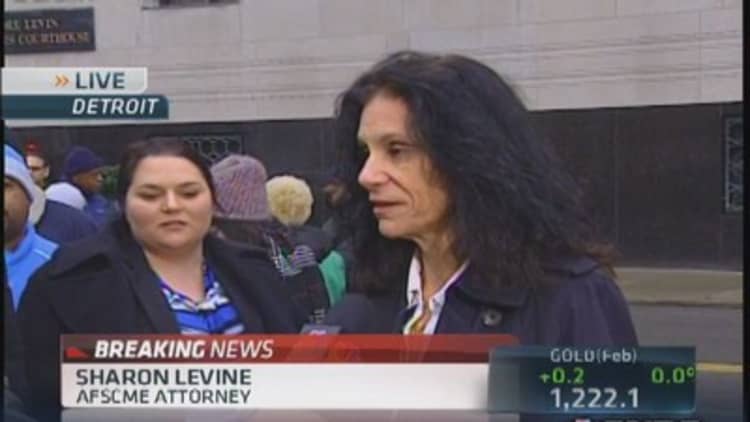
A federal judge declared Tuesday that Detroit is eligible for bankruptcy protection, giving a green light to the nation's largest municipal bankruptcy filing in history.
The contentious dispute pits the city's finance officials against its unions, creditors and retirees, ahead of what are expected to be steep cuts in pensions, as well as fire sales of treasured assets.
"The city no longer has the resources to provide its residents with basic police, fire and emergency services that its residents need," Judge Steven Rhodes said in a ruling that was over 140 pages long.
In the meantime, Detroit's emergency financial manager, Kevyn Orr, is expected to proceed toward the city's next major step: submitting a plan to restructure Detroit's approximately $18 billion in debt.
(Read more: Illinois to vote on pension proposal)
Immediately after the ruling, Detroit's largest public workers union, the American Federation of State, County and Municipal Employees, said it will appeal.
"We're very disappointed. It's a very sad day for the people of Detroit and we've already filed a notice of appeal," AFSCME attorney Sharon Levine told CNBC. "We think that if there had been more time and actual good faith in negotiations, that there could have been potentially a solution that could have avoided this bankruptcy case and been less scary and devastating for the citizens of Detroit."
The judge's decision listed the city's long litany of financial woes, including the loss of manufacturing jobs and population in recent decades.
"As of April 2013, about 48 percent of the city's street lights were not working," Rhodes said. "In 2012 the average police response time was 30 minutes. In 2013, 58 minutes, and the national average is 11 minutes."
There were a number of quirks in the judge's ruling. Among other things, Rhodes said that the city did not negotiate in "good faith" with the unions to whom Detroit owes money—normally a prerequisite for allowing bankruptcy.
At the same time, he noted the obstinacy of the unions in the negotiations saying that the city could not realistically negotiate with a "stone wall."
(Read more: Detroit 3 auto sales top expectations)
—By CNBC.com.

